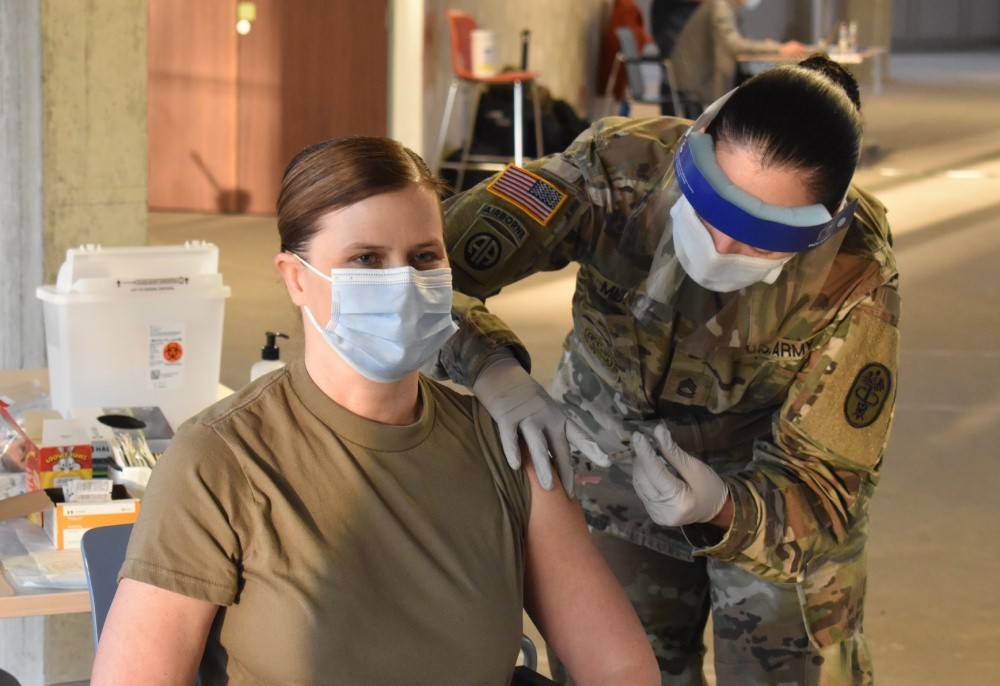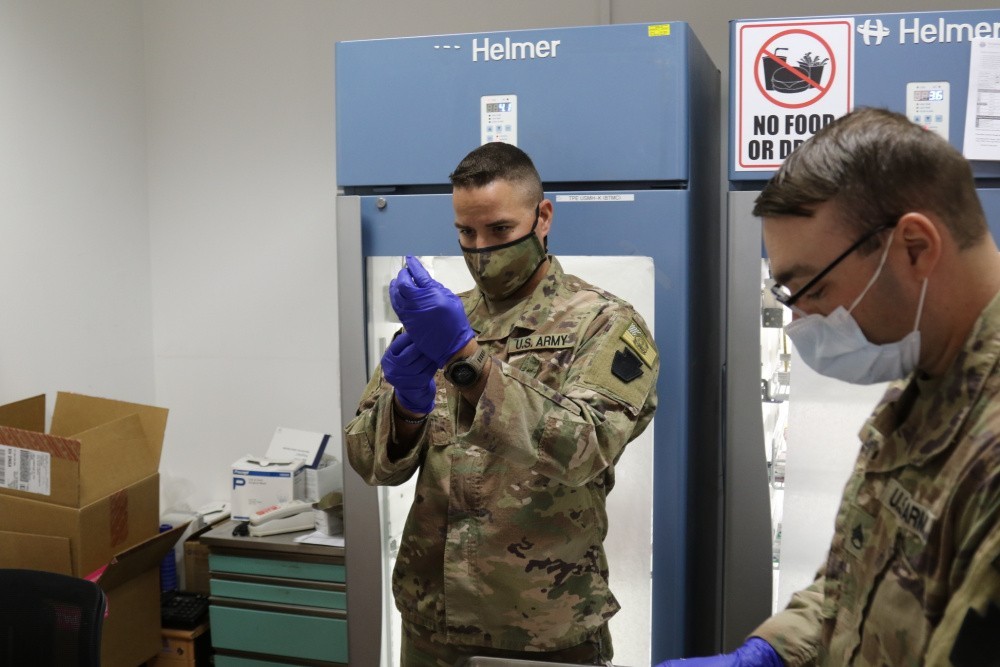By Joseph Lacdan, Army News Service

Col. Kathy Spangler, left, commander of the Supreme Headquarters Allied Powers Europe, Healthcare Facility and Brussels Army Health Clinic, receives a COVID-19 vaccination on Jan. 8, 2021, at the SHAPE clinic at Mons, Belgium. The Army has opened COVID-19 vaccinations to all Soldiers and Army beneficiaries. (Christophe Morel)
Army leaders encourage Soldiers to get vaccinated as DOD ends J&J pause
The Army will resume distribution of the Johnson & Johnson COVID-19 vaccine in limited capacity this week, helping the service reach its goal of vaccinating 80% of the force by July 4, its top medical officer said Monday.
Although the Department of Defense temporarily paused the distribution of the Johnson & Johnson vaccine due to possible adverse reactions on April 13, the Centers for Disease Control and Prevention and the U.S. Food and Drug Administration recently recommended that the pause be lifted, according to a FDA press release last week.
Lt. Gen. Scott Dingle, the Army’s surgeon general, said during a media event that no member of the Army has reported experiencing harmful reactions from taking any of the inoculations. Dingle said he welcomes the opportunity to continue giving the Johnson & Johnson dose to Soldiers.
“The danger of the COVID-19 disease clearly outweighs any risk or side effects from the vaccines,” Dingle said.
The Johnson & Johnson dose accounts for 149,500 of the 2,328,000 total vaccines already given by the DOD. As of Monday, the Army has distributed more than 800,000 COVID-19 vaccines or about 30% of the Army’s beneficiary population. The service has given 88% of the vaccines it has received at 82 locations worldwide.
The Army has also now opened availability of the vaccines to all eligible Army beneficiaries.
“We want full transparency about COVID-19 vaccines so that our beneficiaries and our Soldiers can make a confident and informed choice about vaccinations,” Dingle said.
To help meet the rising demand, Dingle said that Soldiers and beneficiaries can find information to make appointments to receive the vaccines at any DOD vaccination site by visiting: https://tricare.mil/vaccineappointments. The website provides a state by state directory of all vaccination sites that are currently offering appointments.
Dingle noted that due to limited supply, the entire force has not yet been offered COVID-19 inoculations.
“Everybody needs more vaccines so they can vaccinate their Soldiers,” Dingle said. “We are just getting to that point with the increased production of the vaccines where we’ll be able to meet that demand.”
Brig. Gen. Matt Smith, G-3 deputy director of operations, readiness and mobilization, said that the Army encouraged the DOD to focus distribution of the Johnson & Johnson vaccine in austere locations in Europe, Africa, Southeast Asia and the Pacific, because the vaccine can be more easily transported and requires only a single dose.
“It's fair to say that demand has ebbed and flowed as the virus has been flown into different locations,” Smith said. “So when any geographic area worldwide or in the United States surges with the virus, we tend to see, not surprisingly, a surge in demand for that particular area.”
Setting the example
Dingle, who has been fully vaccinated, said that he and Command Sgt. Maj. Diamond Hough, Army Medical Command’s top enlisted leader, have traveled to locations throughout the Army to visit with commanders, Soldiers and medical professionals. Dingle said that the vaccine remains optional for Soldiers, but he strongly encourages them to consider taking it.
The Army has used social media and hosted virtual town halls to help Soldiers make informed choices on whether or not to take COVID-19 vaccines. The service has posted public health information and even used direct calls to reach Soldiers and their families with the most updated information.
Dingle spoke to Soldiers about their concerns about taking the vaccines. He added that installation commanders have taken a “lead-by-example” approach by taking the vaccines themselves in the hopes their troops will follow.
Dingle said some Soldiers changed their minds while distributing the vaccines across the country. He said Soldiers recalled the desperation of civilians, many of whom stood in line for hours to receive the inoculations. Soldiers told Dingle that they saw the impact the vaccine has had on American communities.
“Some said initially that they were hesitant about taking the vaccine,” Dingle said. “But then … as they were administering the vaccines to the civilian population, some of them were brought to tears and touched by the civilians who were so appreciative.”
The Army also has been developing its own COVID-19 vaccine at Walter Reed Army Institute of Research in Silver Spring, Maryland. The Army’s version of the vaccine will be applicable to coronavirus’ different forms, said Dr. Steven Cersovsky, deputy director of the Army Public Health Center in Gunpowder, Maryland.
“It is being designed in such a way that it can be used across all different strains of coronaviruses,” Cersovsky said. “So it wouldn’t be targeted to specific strain types.”

Sgt. Austin Peters, left, and Staff Sgt. Dave Yanetti, both medical specialists with the 28th Expeditionary Combat Aviation Brigade, prepare syringes with the COVID-19 vaccine at a medical clinic in the 28th ECAB's area of operations in the Middle East in March 2021. (Travis Mueller)





